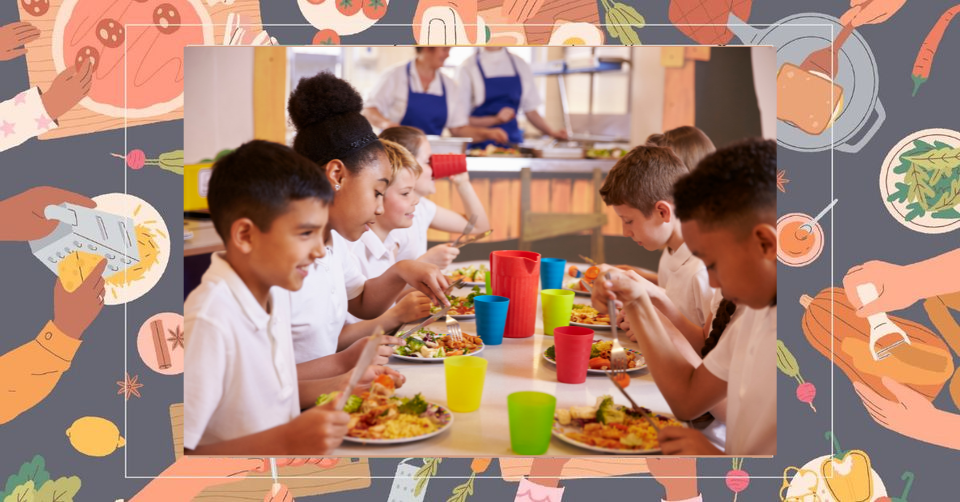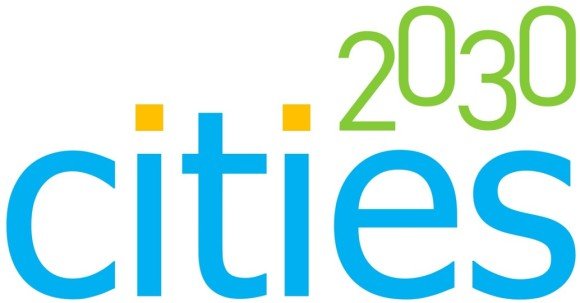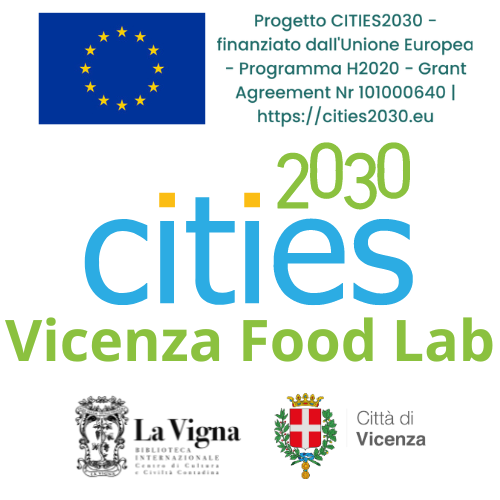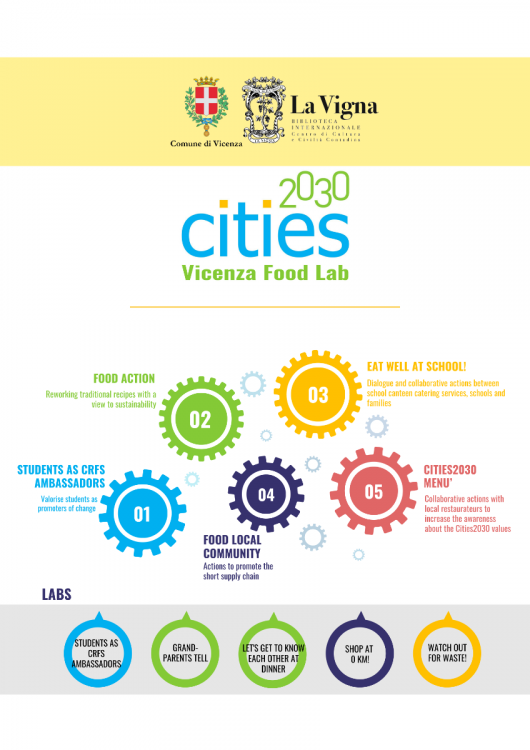- (1) Welcome to Vicenza!
- (2) The Municipality of Vicenza
- (3) The International Library "La Vigna"
- (4) Policy Lab: general overview
- (5) Policy Lab: thematic priorities
- (6) Policy lab: Action Plan
- (7) PassaVIvande: participatory process for the local Food Policy
- (8) Living Lab: Innovation Action Plan
- (9) Stories from the lab: LL#2 - FOOD ACTION: Sustainable Ethnic Dinners
- (10) Stories from the lab: main events (2021-2022)
- (10) Stories from the lab: main events (2023)
- (10) Stories from the lab: main events (2024)
- (10) Stories from the lab: main events (2024) (2)
- (10) Stories from the lab: main events (2024) (3)
- (11) Cities2030 Vicenza Food Lab and its CRFS: the collaboration with IPA Risorgive
- (12) UN Food System Dialogue in Vicenza
- Access history
- Members
- Lab Festival

(8) Living Lab: Innovation Action Plan
1. CRFS vision 2030 and challenge statements
The purpose of the LL is to increase awareness and knowledge of the City Region Food System (CRFS) and the importance of adopting healthier and more sustainable food models, through actions and activities that stimulate the participation of the various stakeholders involved.
CHALLENGE: Increase awareness and knowledge of the City Region Food System (CRFS) and the importance of adopting healthier and more sustainable eating patterns
- Sub-Challenge 1: Promote the short supply chain
- Sub-Challenge 2: Encourage the reduction of waste and the promotion of food reuse
- Sub-Challenge 3: Support the development of networks and alliances around the urban and peri-urban food system
2. Collaboration with stakeholders
| Socio-Economic Dimension | Scientific Dimension | General Public |
| VET Schools and High Schools Local Chefs Urban Traders Trade Associations Local Farmers and producers | Experts La Vigna’s Scientific Council | Volunteers Students Consumers Food Bloggers |
3. Living Lab resources
Location: Vicenza (Italy)
Team:
- 1 CRFS-LL Coordinator (LLC)
- 1 CRFS-LL Innovation Facilitator (LL-IF)
- 3 LL staff members expert in food history, science of cooking, food sustainability
- 5 General contributors to the LL actions (LL-GC)
- 2 LL Communication & Dissemination managers(LL-CD)
- 10 Other role (Other) > Scientific Council & Board of Directors
4. Living Lab experiments
The purpose of the LL is to increase awareness and knowledge of the City Region Food System (CRFS) and the importance of adopting healthier and more sustainable food models, through actions and activities that stimulate the participation of the various stakeholders involved:
EXP 1 STUDENTS AS CRFS AMBASSADORS
Coordinator: La Vigna in collaboration with The Municipality of Vicenza
Brief description: Students from various high schools will be involved in order to provide their own re-elaboration of the key themes linked to sustainability, healthy food and in general to the CRFS of Vicenza and its peri-urban area. Contributions will be provided according to the specialisation of the schools involved and could vary in the range of artistic, literary, audiovisual, digital and technological fields. The materials produced by the students will constitute the basis for dissemination and communication of project activities in the local area.
The experiment will be implemented according to the following steps:
- Preparation of a toolbox to explain the key concepts in a simple and clear way
- Programming a contest between institutes
- Promote moments of reflection on healthy and sustainable nutrition in the city
- Organisation of an event based on the train-the-trainers approach, or an in-training event for the professors of the various institutes who will coordinate the activities
- Collection of the contributions gathered from the schools and their evaluation by a jury of "experts" (to be nominated)
- Organisation of a public event to award the three most interesting ideas collected and communicate to citizen the work done
Objective: Valorise students as promoters of change. Inform and raise awareness among (high school) students on the sustainability issues of CRFS and, at the same time, enhance their skills as ambassadors of change for their peers and the whole of citizenship.
Relation to Cities2030 key objectives: Secure, Healthy and Sustainable Food - Develop food culture and skills
Relation to Cities2030 thematics: Consumption - Waste - Inclusion and equity
Study question: How to increase awareness and knowledge in young people of issues related to sustainability, healthy food and in general to the CRFS of the city of Vicenza?
Target Group: Students and Schools (VET and HIGH Schools)
Timeframe: Feb 2023 - Apr 2023
SMART goals and Monitoring System:
| Description | Indicator & Target |
| Involve different types of schools to increase the variety of young people reached and the number of contributions obtained | Min 4 different school involved (2023) |
| Inform and raise awareness among a significant number of young people about project issues | Min 200 young people reached (2023) |
| Enabling schools to repeat the activity beyond the Cities2030 project | Min 1 School that include this activity or a similar one, in the POF (the teaching and extracurricular activities offered by an individual teaching establishment) 2023/2024 (November 2024) |
Resources:
Lab: STUDENTS AS FOOD AMBASSADORS
EXP 2 FOOD ACTION
Title: FOOD ACTION - reworking traditional recipes with a view to sustainability
Coordinator: La Vigna in collaboration with The Municipality of Vicenza
Brief description: The activities will stimulate individual citizens or groups of citizens to re-elaborate recipes, which they consider in some way significant or emblematic of the territory or the local area or community, with a view to "sustainability". Recipes (re)elaborated by citizens will be given visibility through social channels and project partners, thus contributing to spreading information and awareness on sustainable food choices and habits.
The experiment will be implemented according to the following steps:
- Identification the "Cities2030 Angels", or facilitators of activities that can contribute both to the definition and development of the content and to support the visibility and participation of citizens (eg. Food Bloggers and cookers of the territory, renowned Chefs)
- Defining the rules of the contest "reworking a traditional recipe"
- Organisation of a public event to launch the initiative and engage the citizens, fostering participation
- Organisation of a cooking sessions to support the participants in reworking the recipes and assisting them in their experiments
- Collection, verification and "validation" of the reworked recipes by the project team
- Organisation of a final event to present the results to the community
- Online dissemination of “Sustainable Recipes”
- Collection of the reworked recipes in one e-book
Objective: Create a dimension of knowledge, exchange and collaboration aimed at reworking some traditional recipes with a view to reducing food waste, promoting a diet based on seasonality and local products (km0 and short supply chain), which is sustainable and healthy, but also inclusive, taking into account the "contamination" with "food from the world" and which provide an opportunity for dialogue and participation and development of the social function of food.
Relation to Cities2030 key objectives: Secure healthy and sustainable food - Enhance circularity and local food belts - Develop food culture and skills
Relation to Cities2030 thematics: Consumption - Waste - Inclusion and equity
Study question: How can we reduce food waste and create traditional sustainable recipes?
Target Group: Citizens / consumers, food bloggers and local cookers
Timeframe: March 2023 - May 2023
SMART goals and Monitoring System:
| Description | Indicator & Target | |
|
Min 40 participants (2023) Min 10 sustainable traditional recipes | |
| Communicate and advertise healthier and more sustainable eating habits through recipes | Min 500 downloads of recipes or views in social media (2023) | |
| Highlight the "cultural" and social dimension of food | Min 5 professionals / influencers in the food sector willing to collaborate ("Cities2030 Angels") |
Resources:
Lab: LET'S GET TO KNOW EACH OTHER AT DINNER
EXP 3 EAT WELL AT SCHOOL

Coordinator: The Municipality of Vicenza in collaboration with La Vigna
Brief description: The school canteen catering services (private and public), the Parents' Committees and the Representatives of parents and teachers and school collaborators of the various Educational Institutions and will be involved in co-creation activities to establish a more structured and collaborative relationship, to improve communication between the School managers, the school catering service and the families and to prepare sustainable actions that involve all actors.
The experiment will be implemented according to the following steps:
- Involving key stakeholders and their representatives
- Defining the rules and procedure for meetings
- Organising the meetings
- Collecting and reporting of proposals
Objective: Improve the dialogue between the school catering service and families to increase the satisfaction of school catering and encourage correct eating habits from childhood onwards. Promote collaboration between the school catering service (both internal to the Municipality or provided by external contractors) and families to foster greater visibility of the good practices already implemented, a constructive dialogue on the needs and on any problems that may arise, to inspire innovative solutions and collaboration between all those involved.
Relation to Cities2030 key objectives: Secure Healthy and Sustainable Food - Enhance circularity and local food belts
Relation to Cities2030 thematics: Distribution - Consumption - Waste - Security
Study question: How to promote healthy eating habits from childhood onwards?
Target Group: School canteen catering service, Parents' Committees and Representatives of parents, teachers and school collaborators
Timeframe: Jan 2023 - Mar 2023
SMART goals and Monitoring System:
| Description | Indicator & Target | |
|
Establish 1 stable working group (2023). Min 2 meeting during the experiments (2023). Commitment to continue even after the experiment (2023). | |
| Increase collaboration and mutual understanding between canteen and families | Min 2 concrete proposals elaborated to improve the perception, satisfaction and / or sustainability of the school catering system in one or more schools (2023) | |
| Actively involve families in promoting and implementing sustainable eating habits | Min 1 initiative emerged from the Working Table started (2023) |
Resources:
EXP 4 FOOD LOCAL COMMUNITY
Title: LOCAL FOOD COMMUNITY
Coordinator: The Municipality of Vicenza in collaboration with La Vigna
Brief description: The activities will focus on supporting retail trade to protect the historical and traditional shops and revitalise the trade both in the historic city centre and in the neighbourhoods. At the same time, initiatives and tools will be promoted to reduce food waste that can make it easier to match supply and demand (e.g. expiring food donated or discounted by traders at the end of the day ...). Furthermore, the actions of the experiment will promote the development of the short supply chain, in synergy with the retail trade.
The experiment will be implemented according to the following steps:
- Organisation of a series of meetings-interviews with the trade associations and local farmers, with some retailers and with the consumer associations for an initial discussion on the subject and recognition of the aspects of greatest interest
- Development of activities to explore and assess the possible role of technologies in supporting the zero waste initiatives, with a special focus on promoting visibility, communication and use by citizens (e.g. APP, web platforms, social media, brands, product clubs, awards, ...)
- Collection and reporting of proposals and solutions for the future
Objective: To encourage the participation and a more active role of SME, traders and local producers in the the food sector, in the co-creation, with the Municipality of Vicenza, of useful solutions to increase the CRFS sustainability, starting with the reduction of food waste, raising awareness of virtuous behaviours and the promotion of the short supply chain and local products.
Relation to Cities2030 key objectives: Secure Healthy and Sustainable Food - Enhance circularity and local food belts
Relation to Cities2030 thematics: Production - Processing - Distribution - Markets
Study question: How to develop a network to prevent/to fight food waste?
Target Group: Traders, local producers and farmers, trade associations
Timeframe: March 2023 - May 2023
SMART goals and Monitoring System:
| Description | Indicator & Target |
| Involve and sensitise SME on the issues of sustainability and the renewal of CRFS. Increase the level of individual engagement. | Min 15 meeting-interviews with operators or Trade associations (2023) |
| Support the development of networks and alliances between food system operators, in a collaborative and synergic perspective |
- Establish 1 stable working group (2023) - Min 3 meeting during the experiments (2023) |
| Increase the knowledge and skills of operators with respect to the value of sustainability and the opportunities available (in particular in the fields of technology, communication, social networks) |
- 20 participants (2023) - 1 specific opportunity elaborated (2023) |
| Creation of a stable and lasting network | - Action Plan - Commitment of at least 70% participants to continue even after the experiment (2023) |
Resources:
EXP 5 CITIES2030 MENU'
Title: Cities2030 MENU’
Coordinator: The Municipality of Vicenza in collaboration with La Vigna
Brief description: The activity aims at involving local restaurateurs to include in their menus, even for a temporary period, certain dishes characterised in particular by one or more of the "Cities2030 values" (short supply chain, zero waste, recognition of historical, cultural and identity value of food, sustainability, biodiversity). These dishes can also be the output of the activities of Experiment 1. The activity will proceed with the creation of "identity cards" of the dishes proposed in order to explain and communicate the project values to restaurant customers and consumers.
The experiment will be implemented according to the following steps:
- Launch a dialogue with local restaurateurs to propose an elaboration of the "Cities2030 Menu" based on the Cities2030 Values and the output of Experiment 1
- Definition of the rules to elaborate the “Cities2030 Menu”
- Organisation of an event to launch the initiative and encourage participation
- Creation of a communication campaign to promote the “Cities2030 Menu”
Objective: Create a dimension of knowledge, disseminate information and raise awareness on sustainable food in all citizens and consumers. Increase the awareness about the Cities2030 values.
Relation to Cities2030 key objectives: Enhance circularity and local food belts - Develop food culture and skills
Relation to Cities2030 thematics: Processing - Distribution - Consumption
Study question: How to disseminate information and raise awareness on sustainability of food choices and habits?
Target Group: local restaurateurs and producers
Timeframe: June 2023 - September 2023
SMART goals and Monitoring System:
| Description | Indicator & Target |
| Involve and sensitise local restaurateurs and producers on the issues of sustainability and the renewal of CRFS. | Min 10 restaurateurs involved (2023) |
| Disseminate the Cities2030 values | - Min 5 restaurateurs proposing Cities2030 Menu (2023) - Min 2000 People reached with social media (2024) |
5. Other Living Lab's measures
- General survey (online questionnaire)
- Awareness and Educational Workshop
- Seminars to share knowledge on traditions
- Public events to promote innovative and best practices in the food system arena
- Scientific paper for La Vigna Magazine and for Open Access publication
6. SMART Goals
To monitor the achievement of the LL Smart objectives, we have defined the following indicators:
- Min 4 different school involved (2023)
- Min 200 students/young people reached (2023)
- Min 1 School that inserts the activity, or a similar activity, in the POF 2023/2024 (November 2024)
- Min 40 participants in Food Action (2023)
- Min 10 sustainable traditional recipes (2023)
- Min 500 downloads of recipes or views in social media (2023)
- Min 5 professionals / influencers in the food sector willing to collaborate ("Cities2030 Angels") (2023)
- Establish 1 stable working group between School catering service, Parents' Committees and Representatives of parents, teachers and school collaborators (2023) and Commitment to continue even after the experiment (2023)
- Min 2 meeting during the experiments “Eat well at School”(2023)
- Min 2 concrete proposals elaborated to improve the perception, satisfaction and / or sustainability of the school catering system in one or more schools (2023)
- Min 1 initiative emerged from the working group started (2023)
- Min 15 meeting-interviews with operators or Trade associations (2023)
- Establish 1 stable working group between CRFS operators (2023)
- Min 3 meeting during the experiments “Local Food Community” (2023) with 20 participants
- 1 specific opportunity elaborated during experiment “ Local Food Community” (2023)
- 1 Action Plan of Food Local Community
- Commitment of at least 70% participants of Local Food Community to continue even after the experiment (2023)
- Min 10 restaurateurs involved (2023)
- Min 5 restaurateurs proposing Cities2030 Menù (2023)
- Min 2000 People reached with social media (2024)
7. Communication, dissemination and exploitation
- Social Media: Facebook and Instagram (The International Library La Vigna and The Municipality of Vicenza)
- The City of Vicenza and La Vigna Website: news and events and cities2030’s page.
- Cities2030 Community
- La Vigna Magazine: Giornale di Agricoltura e Gastronomia
- Dissemination Events
8. Continuity- and scale-up measures
Possible funding options to support continuity and scale-up after the Cities2030 project time frame:
- Erasmus Plus Programme
- National or Regional Opportunities (PNRR, PON, POR, etc.)
- Transformation of the La Vigna International Library into a participatory foundation
- Crowdfunding Events
9. Risk assessment
Potential risks and probability:
- delays due to the worsening of the Covid-19 pandemic > Medium
- low performance due to tight deadlines and communication problems among team members > Low
- delays in procurements (services, materials, infrastructures) > Medium
- low active participation > Medium
Risk elimination and mitigation tasks:
- provide an alternative route of activities to be carried out online
- plan periodic meetings with the stakeholders involved and team members so that there is constant coordination of activities and compliance with deadlines
- starting from the design phase (IDEATE) of the experiment, agree on the services, materials and infrastructures necessary to carry out the activities
- Ideate and prepare innovative methods of involving people and key opinion leaders that can also attract other stakeholders


